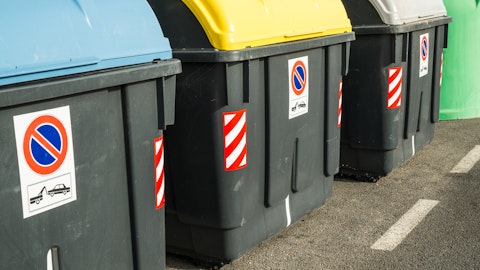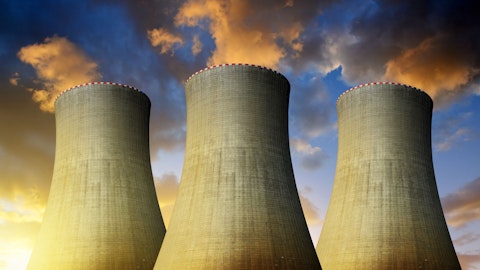Brian Russo: And then lastly, just on the mix of that $100 million, it is kind of — are you looking for maybe 60-40 Services, Treatment?
Ben Naccarato: Yes, that’s kind of the general, 60-40. Maybe even 55-45 because of the new facility depending on how it does.
Operator: The next question is coming from Ross Taylor from ARS Investment Partners.
Ross Taylor: Just a couple of quick things. One, the DFLAW situation opportunity is in no way really impacted by the unsettled nature of the other contracts?
Mark Duff: That’s a good question, Ross. The DFLAW operation is tied to a tri-party agreement between DOE, the regulator and EPA. So it is completely different or is not tied to that procurement. So DOE has an obligation to be up and running. I want to say there’s a couple of slips because of COVID. I want to say that the milestone is going to say, August of 25, I believe, where there’s potential for fines and penalties after that point. So DOE try not to get anywhere close to that. Again, it slipped from December of ’23 because of COVID and is a very important milestone that DOE reports to Congress on and to the regulators on a regular basis. So it’s not — it’s not tied to a procurement at all.
Ross Taylor: Okay. And so that — and that’s why you’re confident that this is all about getting the melters up and operating. And once they’re up and operating, they’re going to push this through. They’ve been working on this for decades. And so that’s where you’re confident that, that income flow, whether it’s $3 or around $3, whatever on a run rate basis. That’s where that comes from. Second, Italy and Europe. I noticed some of the choice of words you used in Italy made me feel that you would be more surprised not to get the contract than if you got the contract. Is my read correct?
Mark Duff: I hate to speculate on anything to do with procurement, Ross, because crazy things can happen. We’ve been optimistic for quite some time. The reason we’re optimistic, Ross, is the way that it works in Europe is they down-select. So this procurement has been going on for 10 years and it started out with 6 or 7 bidders, maybe 9 and it gets down to 2. So your optimism goes up as you go down and we feel like we’re in a good position, a really good position with our team. And I can’t say that we’ve won or that we’re more optimistic than we were before but just that we remain optimistic that we should hear in early September.
Ross Taylor: Okay. Well, we look forward to hearing that. Talking about Europe, it would appear you have a lot of opportunities there, a lot of things to come on. If you win the Italian job, for lack of better phrase, you have your relationship, you’re going to build out a facility in the U.K. to treat. In the interim, you’re going to treat in the U.S., any business that you get from Europe, be it Croatia, Germany or elsewhere?
Mark Duff: Exactly, exactly. That’s what we’ve been doing now is we’ve been shipping over from Europe to our Northwest facility to the incinerator units we have in Northwest which are very well suited for this kind of work. And it’s a little different with out-of-country waste treatment because you have to commit to giving all of the residual back to the host country. And our incinerator units, we call BPUs, are designed to do just that. So we can — very high-quality take a residual and package it and ship it back to them. And they get the stabilization value out of that as well as the significant size reduction value of about 90% overall for long-term storage over there. So it works well. And it’s obviously higher transportation costs and that’s what we’ve cut out if we had the same facility in the U.K. as planned.
Ross Taylor: So what happens with margins if you’re able to move this business from treating it in the U.S. to treating in the U.K.? How big a boost on margins would that be?




